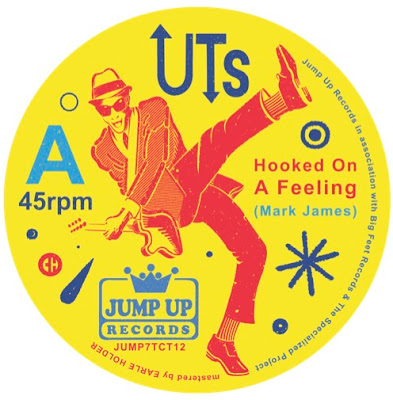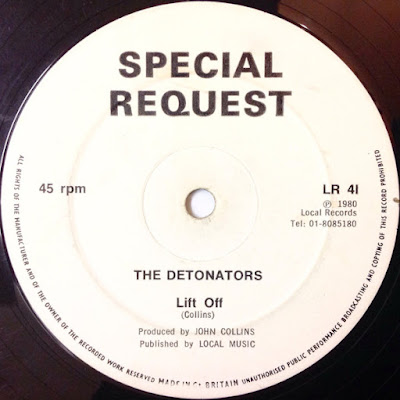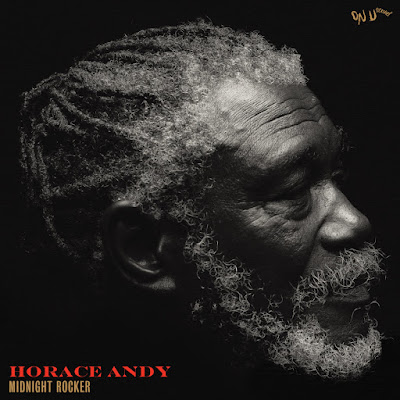Editor's note: Shots in the Dark spotlights Third-Wave ska releases that should have been massive hits on the scene but, due to bad timing, poor luck, or a fickle record-buying public, were lost in the fray.(Appreciation by Steve Shafer)
The Band: The Adjusters, an overtly left-wing, mod-ish ska-soul band from Chicago who were heavily influenced by
The Redskins (anti-fascist, socialist soul-rockabilly-punk skinheads, who released several singles and one classic album,
Neither Washington Nor Moscow) and
Billy Bragg (anti-fascist, socialist folk-punk rocker who still endeavors to write protest songs that are about both the personal and political, and has released a host of singles and albums, including my favorite
Talking to the Taxman About Poetry, which sports the best-ever critique of Reagan's Cold War-era USA:
"Help Save the Youth of America" (some of which is
terrifyingly relevant again*)). This interracial, mixed-gender band was composed of Daraka Larimore-Hall (who is half-Jamaican) and Jessica Basta on vocals, Jason Packer on guitar, Matt Parker on organ/piano, Rench on drums, vocals, and samples, and Joshua Thurston-Milgrom on bass.
The Sound: The Adjusters' incendiary 1997 debut
Politics of Style (Jump Up Records) veers between Stax soul, JB funk, rootsy reggae, and traditional (not 2 Tone) ska. Their 1998 follow-up on Moon Ska Records
Before the Revolution (produced by Victor Rice) further refined the formula to greater effect with an even better collection of tracks (full disclosure, when I was at Moon Records I worked with the band promoting this record). 2003's
Otis Redding Will Save America (blessed with a mind-blowingly good co-production by Rice and Rench) blended
hip-hop, Big Beat, and trip-hop into the mix for a searing and unblinkered look at America in the years just before and after the Twin Towers fell.
The Release: The writing, recording, and mixing of The Adjusters'
Otis Redding Will Save America straddled one of the most dramatic paradigm shifts in American history: the immediate pre- and post-9/11 years. The relatively peaceful and prosperous Clinton '90s wound down with an absurd
impeachment over lying about sex (and we didn't fully comprehend the portents of the
1993 World Trade Center attack and
1995 Oklahoma City bombing and how they would shape the next two decades). The
first dotcom bubble burst and the
Y2K freakout was (thankfully) a bust.
The George W. Bush years started badly with an
election swung his way by the right-wingers on the Supreme Court and
only went down from there. After apparently
ignoring our intelligence service's red alert signals about the coming terrorist attacks, Bush led the nation into a particularly nightmarish and tragic period in the USA following
9/11. It all culminated in the appalling--and completely unnecessary and unprovoked--2003 Iraq War (that eventually
killed around 4,500 American servicepeople, tens of thousands of Iraqi insurgents, and around 600,000 Iraqi civilians). Even as it was all unfolding back then, it was obvious that the George W. Bush Administration was
lying that Iraq had weapons of mass destruction and
that Saddam Hussein was behind the 9/11 attack. They simply wanted to justify a preordained invasion of that country (when
it was likely that elements within the Saudi government helped the al-Qaida terrorists carry out their mission).
The 9/11 attacks did more than
murder several thousand Americans. They shook us to our core and unleashed our darkest impulses in our so-called War on Terror--leading us to abandon our laws and values to assuage our security fears and nurture our lust for revenge. And our country did more to destroy itself and betray everything that America purports to stand for than 12 hijackers could ever dream of accomplishing.
(Just as a reminder, here are some of the
appalling lowlights of our War on Terror:
the torture--and
waterboarding is torture--and
indefinite detention of suspected terrorists; the use of
extraordinary rendition; the
illegal monitoring and wiretapping of Americans' e-mails and phone calls under
The Patriot Act; the
profiling and quasi-legal surveillance of American Muslims; the
"unitary executive" theory and use of
Presidential signing statements;
the Bush Administration's deliberate misinterpretation and shredding of our nation's laws; and does anyone remember
that insane psych-op weekend when Americans across the country freaked out after the White House suggested that Americans buy duct tape and plastic sheeting in case of a dirty bomb/bio-chemical attack?)
The Adjusters believed that America--which has
never quite lived up to its promise in the Declaration of Independence that
all people are created equal and have the right to life, liberty, and the pursuit of happiness--had not only lost its shit but had badly lost its way.
While the band was recording the album in
Version City's spartan basement studio on East Third Street in Manhattan, one of the band members visited the restroom of the bar upstairs and noticed something written on the toilet stall wall (in what would become their own
Smells Like Teen Spirit moment):
Otis Redding will save America.
Eventually, The Adjusters realized that this phrase encapsulated everything they were trying to convey with this album.
Otis Redding, the "King of Soul," had attempted to goad America into locating its conscience as it staggered through one of its most turbulent, violent, and hate-filled decades. He was one of the first Black soul singers who broke through to the white rock audience (see this video from the
'67 Monterey Pop Festival) as an undisguised, undiluted, and unbowed Black man (in the 1960s, Black men accepted within white pop culture usually weren't permitted to be regular human beings who could express, or be the overt object of, sexual desire--see the
constraints placed on Sidney Poiter by Hollywood). This was at a time when America was forced to come to terms with its white supremacist/Jim Crow legacy and recognize and support the equal/legal rights of Black American citizens; endure a string of devastating political and racial assassinations (JFK, MLK, Jr., RFK, Malcolm X, Medgar Evers, and many lesser-known
Civil Rights martyrs); and muddle through an unwinnable, imperialistic proxy war with China and Russia in Vietnam that killed
58,200 young US soldiers (average age:
23) and
millions of Vietnamese.
To give some context to Redding's extraordinary and unprecedented impact on American society, check out this
appreciation in The New Yorker: "Marching in place to keep pace with the beat, pumping his fists in the air, striding across stages with a long-legged gait that parodied his “down home” origins, Redding’s confident yet unaffected eroticism epitomized the African-American ideal of a “natural man.” White audiences of the time had never seen anything like it. The effect was so powerful that Bob Weir, of the Grateful Dead, said, of Redding’s performance at the Monterey Pop Festival, "I was pretty sure I’d seen God onstage"...In the way he looked and the way he sang and the way he led his tragically unfinished life, this princely son of Georgia sharecroppers was a one-man repudiation of the depraved doctrine of "white supremacy," whose dark vestiges still contaminate our world." (After over 4,000 documented lynchings of Black Americans from 1877 to 1950, the US finally has the
Emmitt Till federal anti-lynching bill on the books, which was
signed into law by President Biden and defines lynching as
"a hate crime that results in death or serious bodily injury.")
To heal the nation, Redding pleaded with everyone to
"try a little tenderness," which isn't just about relations between the sexes. The country needed (and still needs)
heaping doses of empathy for white America to see Black Americans as their fellow human beings. But Redding also insisted that
respect be shown to Black citizens in his hit song transformed into an
early feminist and Civil Rights anthem by Aretha Franklin. Notably, Redding's posthumous hit
"Dock of the Bay" underscored the loneliness and aimlessness of being rejected by the society that birthed and (reluctantly) fostered you.
While Redding never finished his journey (
he died in a plane crash at age 26 along with most of the members of his backing band the Bar-Kays), his music and insistence on being his unreserved self in public on stage offered the hope that America could be a pluralistic society that embraced diversity and recognized everyone's rights equally.
For
Otis Redding Will Save America, The Adjusters expanded their sound to further explore/honor Black American music beyond their mod-ska-soul mix and incorporated hip-hop and its musical descendants filtered through British subculture: trip-hop and Big Beat (Lionrock's
"Rude Boy Rock" and Sly and Robbie's
Drum & Bass Strip to the Bone by Howie B influenced this record enormously). Of course, practically all American popular music was created by Black American musicians: jazz, blues, R&B, soul, rock 'n' roll, and hip hop (Black music is one of the United States' most powerful cultural exports and a primary driver of our entertainment economy). And The Adjusters were about celebrating Black American music.
This expanded musical palette may have been a bridge too far for hard-line ska fans, but The Adjusters never comfortably fit within the confines of the '90s US ska scene, which skewed more towards punk rock (it's worth noting that in its original '76-'77 incarnation, punk stripped rock 'n' roll of its Black origins in R&B and gospel). And The Adjusters' overt democratic socialist stance and political activism through
Modern Action and the
Democratic Socialists of America was
sometimes a sore point among the reactionary, almost libertarian (barf) elements of the ska fan base (even though some of our country's most popular social and educational programs--Social Security, Medicare, Veterans Administration, public schools, public universities, public libraries--are all socialist in nature). But The Adjusters never cared about discomforting the comfortable and privileged (see Daraka's comments about the 1998 Ska Against Racism Tour in the
Chicago Reader**).
Like The Specials, The Adjusters wanted their music to move your body and their message to stimulate your mind. So,
Otis Redding Will Save America is equal parts party soundtrack and political rallying cry--both essential for surviving desperate times. And it's one of the best albums that the '90s ska scene ever yielded.
Otis Redding Will Save America opens with
"WTF Ska" an old school-sounding tune that's laid over a decidedly new school drum loop (
this ain't downtown JA!). It's the instrumental version of
"When Things Fall," which appears later on the record and is an appeal for solidarity across race and class lines in the face of injustice and adversity--and pretty much sums up the theme of the entire album. The Adjusters' superb and powerful cover of Gil Scott-Heron's
"Gun" is about the fraying of the social contract (to the point where every one of your fellow citizens is a potential threat) and a society where violence and killing are both way of life and entertainment.
Everybody's got a pistol
Everybody's got a .45
And the philosophy seems to be
At least as near as I can see
When other folks give up theirs, I'll give up mine
This is a violent civilization
If civilization's where I am
'Cause every channel that I stop on
Got a different kind of cop on
Killing them by the million for Uncle Sam
But Saturday night just ain't that special
Yeah, I got the constitution on the run
Yeah, 'cause even though we've got the right
To defend our home, to defend our life
You got to understand to get it in hand about the guns"Can't See the Light," an original, traditional-sounding rocksteady cut (that features Dr. Ring Ding), is about being comfortably numb and disconnected as the world burns around you--and refusing to take sides or even recognize right from wrong (and alludes to
The Clash coming to terms with reality with this lyric:
So safe and warm in your nice suburban home).
"Master Blaster" is, of course, a Stevie Wonder cover. It's his 1980 reggae tribute to Bob Marley that incorporates part of "Jammin'" and celebrates
Zimbabwe's hard-fought independence from their colonial British overlords and Black self-determination, in general (Jessica Basta takes lead vocals here and really shines).
Sounding like a lost Public Enemy cut from
It Takes a Nation of Millions to Hold Us Back, "If You" is an extraordinary and wickedly fierce hip-hop track featuring the mighty T.O.N.E. on vocals and built on a sample from Wagner's
"Ride of the Valkyries" (
most famously used during a brutal attack on a Vietnamese village just after the
"Charlie don't surf scene" in
Apocalypse Now). It offers sharp commentary on how bringing about real change demands so much more than performative gestures.***
If you're sick of seeing Black people gettin' shit
Raise your fist (raise 'em up, raise 'em up)
And if you're sick of seeing women gettin' hit
Raise your fist (raise 'em up, raise 'em up)
And if you're sick of seeing poor people gettin' dissed
Raise your fist (put 'em up, put 'em up)
And if you wanna do something 'bout it
You gotta do more than raise your fist to get pissed
The downbeat "Monkey Hate Reggae" is about a disaffected youth in a no-future rust belt town coming under the sway of a "right-wing libertine" and acting out violently as a result (shades of
"Clampdown"). The ebullient
"The Fightback, Part II" revisits and amps up this funk-powered
Before the Revolution track, but recasts its lyrics to laud the
massive antiglobalization protests at the 1999 World Trade Organization's meeting in Seattle ("Corporations split the world in two/Which side, which side for you?...You can't fight the man alone/Fuck with the people and the people fight back").
The instrumental booty-shaking dancefloor-filling portion of
Otis Redding Will Save America is a collection of genre-bending trip-hop tracks packed with elements of reggae, funk, and hip-hop, plus samples galore (this entire album features some seriously deep grooves and crazy, next-level rhythms thanks to secret weapon Rench). The awesome
"Mumia in Tibet" (which refers to
Mumia Abu-Jamal) is like a drum 'n' bass mash-up with something off Jump With Joey's
Ska Ba. "Boomstick" borrows Musical Youth's intro to "Pass the Dutchie" ("This generation...rules the nation...with version!") for this fantastic percussive workout. And
"Supergoodlookin" brings the funk for when you want to get down and funky ("...take it home if you like it/Finger-licking good/Take it home if you like it").
Otis Redding Will Save America concludes with the sobering reality of
"It's Like That." The struggle for equality and social/economic justice is far from over and must continue at all costs, despite people's apathy and the considerable power of the forces perfectly happy with/exploiting the status quo: "Can't tell the rich man to stop scheming/But we can change this shitstem/If only we look past the horizon...You may not feel the situation/But give it a generation/It's not gonna look good to my grandchildren."
The Ugly Reality: The Adjusters'
Otis Redding Will Save America was released just a few years after the ska meltdown at the end of the 1990s when the scene was abandoned by the wannabes and driven/shamed back underground. So, the audience to enjoy it and the scene infrastructure to promote it was largely gone. And it didn't help that
Otis Redding Will Save America was only available as an import from
Grover Records in Germany. Right after The Adjusters finished recording the album,
Moon Ska went under (on December 17, 2000), but Bucket was kind enough to release the unmixed masters to the band so they could finish and issue the record elsewhere. After the album was released by Grover, plans were in place to tour Europe in support (Daraka was living in Norway at the time and other members of the band took leave of their jobs or quit), but everything was canceled at the last minute. The band broke up as a result--and none of the tracks on
Otis Redding Will Save America were ever played live.
It's also incredibly ironic that an album about the battle for America's soul has never been released domestically. But perhaps worst of all is that these songs about racism, hatred, inequity, gun violence, and the longing to change the power structure of our economy and political system are still painfully relevant almost 20 years later, maybe even more so now than they were in 2003.
+ + + +
Notes:
* I happened to catch Billy Bragg at The Beacon Theater on his brilliant first tour of North America in 1984 opening for Echo and the Bunnymen during their magnificent Ocean Rain tour.
** [From the Chicago Reader's "Ska's Lost Cause" article:] "The Adjusters’ Larimore was more skeptical. “Not talking about racism as a system, or racism as something that you should be actively fighting against, but talking about it like, ‘You shouldn’t be mean to black people,’ is just ridiculous,” he said. “It’s like the 2-Tone take on racism, which in the 2-Tone context meant something completely different. There you had a racially diverse scene where people were beating each other up, so going out and saying ‘Hey, don’t beat each other up’ was a progressive thing and part of the more socialist agenda of the people behind 2-Tone. But going to a ska crowd that’s 99 percent white and pretty solidly liberal–especially on race issues–and saying ‘Don’t beat up black people’ is like going out and saying ‘Don’t molest children.’ They might as well do Ska Against Incest.”"
*** Here are some of my favorite verses from "If You" worth quoting here:
If I'm a villain
Let's love the penicillin
I'm not sick with crimes
I'm sick with rhymes
New gang bang
I bang slang for fame
Guiliani, ha!, punany
The same thang...
And
Smiling faces lyin' to the races
You got a facelift, but you're still a racist
You might like your blunder
My hatred alone will rend you asunder
I've got a mind to triumph my will
Look in my eyes, got expression to kill
Syllogisms for your fascisms
You won't find me in your high-tech prisons
Damn!+ + + +
Much thanks to Daraka Larimore-Hall for filling in a few of the blanks and providing several corrections.
+ + + +

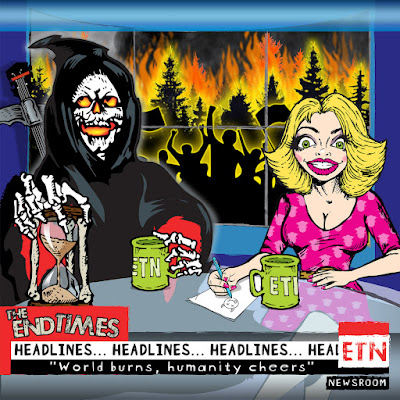
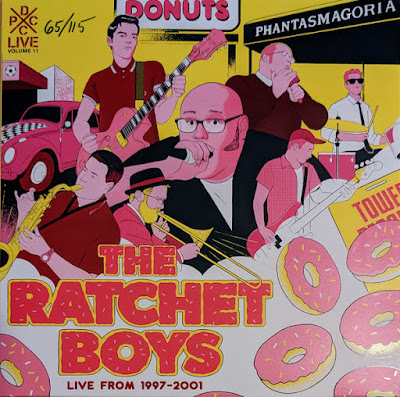
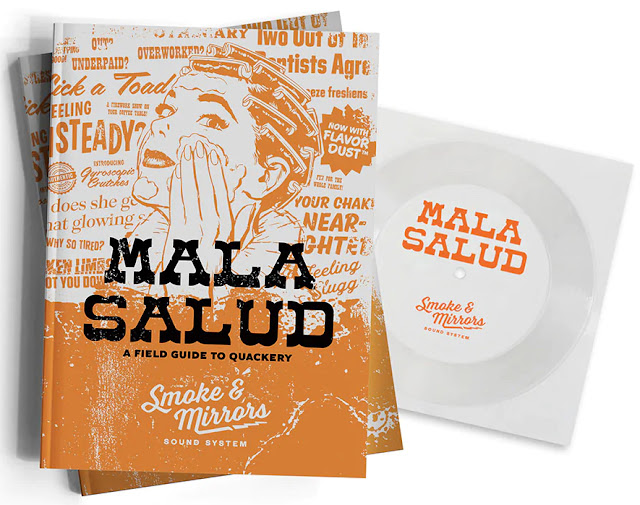
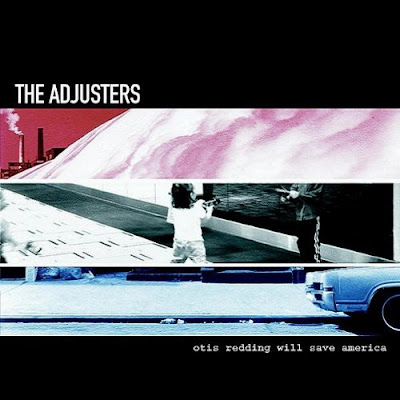



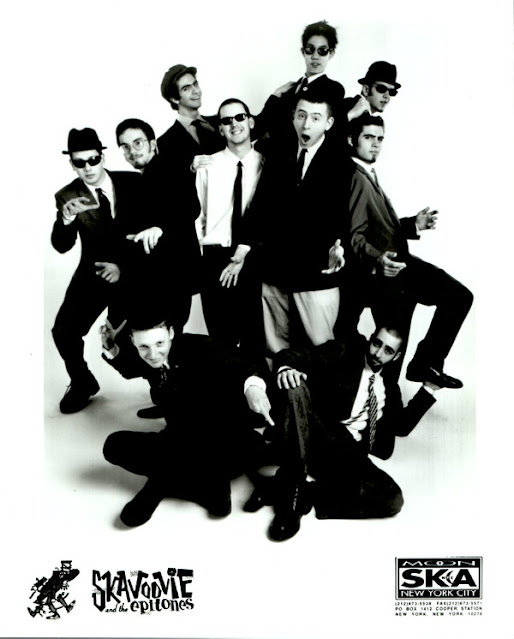

.jpg)

